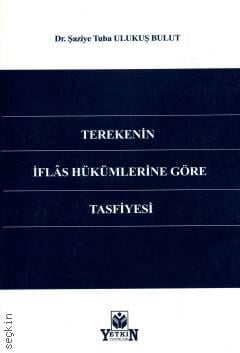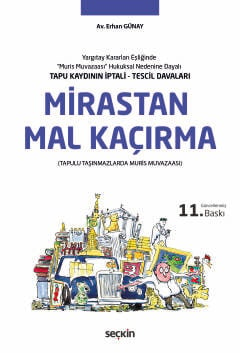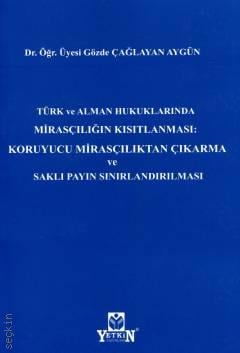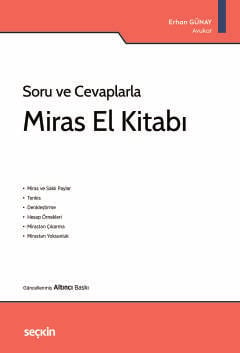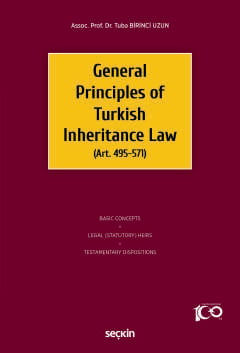
1. Baskı,
Temmuz 2024
Kitabın Detayları
Dili:
İngilizce
Ebat:
16x24
Sayfa Sayısı:
200
Kitabın Fiyatı:
435,00₺
24 saat içerisinde temin edilir.
Kitabın Açıklaması
This book entitled General Principles of Turkish Inheritance Law examines the provisions of the Turkish Civil Code between 495 and 571. In order to make the book easy to understand, a simple language has been used throughout the book and the theoretical information has been supported by several examples.
The book consists of 18 chapters as follows:
Introduction to inheritance law
Basic concepts of inheritance law
Legal heirs
Testamentary dispositions
Types of wills
Revocation of will
Principles of will interpretation
Appointing heirs and bequeathing legacy
Conditions and burdens in testamentary dispositions
Designation of substitute heir and remainderman
Establishment of a foundation by testamentary disposition
Appointing an executor of a will
Contracts of succession
Contracts of renunciation of inheritance
Annulment of testamentary dispositions
Testamentary freedom, statutory entitlement (reserved share) and disposable part of the estate
Disinheritance
Action for reduction (action in abatement)
The book is intended for Turkish lawyers practising internationally, foreign lawyers wishing to gain a general understanding of Turkish inheritance law, and students and researchers studying law in Englishwishing to improve their legal English.
Kitabın Konu Başlıkları

Basic Concepts

Legal (Statutory) Heırs

Testamentary Dispositions
Kitapla İlgili Kategoriler
Yorumlar
Kitabın İçindekileri
Table of Contents
Foreword
5
List of Abbreviations
15
CHAPTER I
INTRODUCTION TO INHERITANCE LAW
I. Concept of inheritance law
17
II. Functions of inheritance law
17
III. Views influencing inheritance law regulations
18
IV. Related legislation
20
CHAPTER II
BASIC CONCEPTS OF INHERITANCE LAW
I. Deceased
23
II. Death
23
III. Estate
24
IV. Principle of universal succession
26
V. Heir
28
VI. Legatee (testamentary beneficiary)
28
VII. Testamentary dispositions
29
CHAPTER III
LEGAL (STATUTORY) HEIRS
I. Concept of legal (statutory) heir
31
II. The first parentela (descendants)
32
III. The second parentela (parental line)
33
IV. The third parentela (grandparental line)
33
V. Heirship of the adopted child
34
VI. Surviving spouse
34
VII. Heirship of the state
35
CHAPTER IV
TESTAMENTARY DISPOSITIONS
I. Concept of testamentary dispositions
37
II. Testamentary freedom
38
III. Testamentary capacity
39
CHAPTER V
TYPES OF WILLS
I. Holographic will
43
A. In general
43
B. ments
43
1. Handwriting
43
2. Testamentary purpose (animus testandi)
45
3. Date
45
4. Signature
46
C. Deposit of a holographic will
47
II. Will by public deed
47
A. In general
47
B. Will drawn up by reading and signing
48
C. Will drawn up without reading and signing
48
D. ments for witnesses
49
III. Oral will
50
A. In general
50
B. ments
50
C. Procedure
51
D. Loss of validity
53
CHAPTER VI
REVOCATION OF WILL
I. In general
55
II. Express revocation of a will
55
III. Implied revocation of a will
56
IV. Revocation of a will by destruction
58
CHAPTER VII
PRINCIPLES OF WILL INTERPRETATION
I. In general
61
II. Interpretation of the will as declared
61
III. Subjective interpretation
62
IV. Using reasons and evidence other than testamentary dispositions
63
V. Principle of favor testamenti
63
VI. Interpretation in favour of the legal heir
65
CHAPTER VIII
APPOINTING HEIRS AND BEQUEATHING LEGACY
I. Appointing heirs
67
II. Bequeathing legacy
70
A. In general
70
B. Specific bequest
71
C. General bequest
72
D. Elective bequest
72
E. Sub–bequest
73
F. Advance bequest (pre–legacy)
74
G. Annuity bequest
74
H. Procurement bequest
75
I. Bequest of usufruct
75
J. Bequest made for the transfer of the right to a claim
76
K. Bequest made to release a person from debt
77
L. Bequest of life insurance
77
CHAPTER IX
CONDITIONS AND BURDENS IN TESTAMENTARY DISPOSITIONS
I. Conditional testamentary dispositions
79
II. Testamentary burdens
81
CHAPTER X
DESIGNATION OF SUBSTITUTE (ALTERNATE) HEIR AND REMAINDERMAN
I. Designation of substitute (alternate) heir
87
II. Designation of remainderman
92
A. In general
92
B. Stages
95
CHAPTER XI
CREATION OF A FOUNDATION BY A TESTAMENTARY DISPOSITION
I. In general
101
II. Application for the registration
102
III. Acquisition of ownership of the allocated assets
102
CHAPTER XII
APPOINTING AN EXECUTOR OF A WILL
I. In general
105
II. Duties and powers of the executor of a will
106
III. Supervision of the executor of a will
108
CHAPTER XIII
CONTRACTS OF SUCCESSION
I. In general
111
II. Types of contracts of succession
112
A. Positive contract of succession–negative contract of succession
112
B. Unilateral contract of succession–bilateral contract of succession
113
C. Contract of succession with consideration–contract of succession without consideration
114
III. Capacity to make a contract of succession
115
IV. Form of the contract of succession
117
V. Termination of the contract of succession
119
A. By mutual agreement of the parties
119
B. Reservation of the right of unilateral revocation by the testator
120
C. Unilateral revocation by the testator in the case of a ground for disinheritance
120
D. Non–performance of the inter vivos obligation
121
E. Lack of testamentary capacity
121
F. Lack of form
122
G. Defects of consent
122
VI. Nullity of the contract of succession
123
A. Predeceased heirlegatee
123
B. Unworthiness to inherit
124
C. Contract of succession between divorced spouses
124
D. Fictitious contract of succession
124
VII. Dispositions contrary to the contract of succession
125
CHAPTER XIV
CONTRACTS OF RENUNCIATION OF INHERITANCE
I. Definition of the contract of renunciation of inheritance
129
II. Parties of the contract of renunciation of inheritance
130
III. Form of the contract of renunciation of inheritance
130
IV. Legal effects of the contract of renunciation of inheritance
130
A. With regard to the renouncing party
130
B. With regard to the descendants of the renouncing party
131
V. Nullity of the contract of renunciation of inheritance
132
A. If the renunciation is in favour of a specific person
132
B. If the renunciation is not in favour of a specific person
132
VI. Rights of the creditors of the estate
133
CHAPTER XV
ANNULMENT OF TESTAMENTARY DISPOSITIONS
(DECLARATION OF INVALIDITY OF TESTAMENTARY DISPOSITIONS)
I. In general
137
II. Grounds for invalidity
137
A. Lack of testamentary capacity
137
B. Defects of consent
139
1. In general
139
2. Mistake
140
3. Fraud
140
4. Duresscoercion
141
5. Unfair exploitation
143
6. Mental reservation, locandi causa and simulatio
144
C. Unlawfulness and immorality
145
D. Lack of form
146
III. Action for annulment
147
CHAPTER XVI
TESTAMENTARY FREEDOM, STATUTORY ENTITLEMENT
(RESERVED SHARE) AND DISPOSABLE PART OF THE ESTATE
I. Testamentary freedom
151
II. Statutory entitlement (reserved share)
152
III. Disposable part of the estate
160
IV. Calculation of the disposable part
161
CHAPTER XVII
DISINHERITANCE
I. In general
165
II. Punitive disinheritance
165
A. In general
165
B. Grounds for punitive disinheritance
166
1. If the heir has committed a serious crime against the testatora person close to the testator
166
2. If the heir has seriously breached hisher obligations under family law towards the testatormembers of the testator's family
167
C. Form of punitive disinheritance
169
D. Legal effects of punitive disinheritance
170
III. Protective disinheritance
172
CHAPTER XVIII
ACTION FOR REDUCTION (ACTION IN ABATEMENT)
I. Concept of reduction
175
II. ments
175
III. Claimant
176
IV. Defendant
177
V. Procedure
177
VI. Transactions subject to reduction
178
VII. Reduction procedure
181
VIII. Order of reduction
184
Bibliography
189
Glossary
197
Hakkımızda
|
Uluslararası Yayınevi Belgesi|
Kaynakça Dosyası|
Kişisel Verilerin Korunması |
Üyelik|
Siparişlerim|
İade Politikası|
İletişim